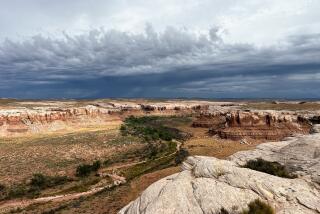Policy Could Increase Access to Wild Lands
- Share via
WASHINGTON — Disputed roads and paths through wilderness areas could be made more accessible to the public if state and local governments take advantage of a new policy that the Bush administration is expected to announce later this week, according to environmentalists and Interior Department officials.
The policy could permit traffic across disputed rights of way that cross all kinds of federal lands -- from national parks to refuges and forests.
“The impact will be felt in numerous small property disputes between state agencies and the federal government,” said James Hughes, deputy director of the Interior Department’s Bureau of Land Management.
“We’ll be able to resolve those without lengthy legal disputes or congressional action.”
Environmental groups and their supporters in Congress say that the new so-called “recordable disclaimer interest rule” could harm public lands by opening the door for the Bush administration to transfer to the states ownership of thousands of disputed rights of way.
The result could be fewer protected wilderness areas and more access for motorized vehicles, they said.
The impact is expected to be greatest in Utah and Alaska, where the states dispute thousands of miles of trails, animal tracks and even former wagon routes.
California could feel the impact of the rule too, because some counties, such as San Bernardino, have already cleared the way to claim the contested paths.
“This will let the administration enter into closed-door negotiations for paving our national parks, refuges and forests,” Sen. Patrick Leahy (D-Vt.) said. “It’s another dilution of the ‘public’ part of ‘public lands.’ ”
Congressional Democrats and environmentalists criticized the policy as the most recent of many actions by the administration to cut back on environmental protections.
But the Bush administration said its new policy is aimed at avoiding costly bureaucratic red tape. “Our goal is to not spend a lot of money adjudicating this or spend the Congress’ time on what is basically an administrative issue,” said Hughes, the Interior official.
The critics said the administration was seeking a route to reestablish Statute 2477, an 1866 law that allowed states to claim rights of way across federal lands. Congress repealed that rule in 1976.
A draft fact sheet explaining the administration’s initiative states that Statute 2477 right of way disputes can “without question” be resolved through the new policy. However, the administration argues that the new policy is crafted broadly enough that it does not conflict with a moratorium on rules and regulations relating narrowly to Statute 2477.
Heidi McIntosh, conservation director for the Southern Utah Wilderness Alliance, said the full impact of the new policy is “not going to be apparent immediately.”
“Eventually, thousands of these so-called rights of way will be given away,” she said.
This could end up making it harder for groups such as hers to pressure Congress to designate remote areas as wilderness, she said. Areas can be disqualified as wilderness if there is preexisting development.
She also said it could make it easier for off-road vehicle enthusiasts to gain access to protected public lands. “There are a variety of ways this statute could really wreak havoc on public lands management and protections,” McIntosh said.
But Hughes said the environmentalists were painting a “worst-case scenario” of the effects of the new policy.
“I think they’re probably overstating the impact of the rule,” Hughes said.
*
Times staff writer Miguel Bustillo contributed to this report.
More to Read
Get the L.A. Times Politics newsletter
Deeply reported insights into legislation, politics and policy from Sacramento, Washington and beyond. In your inbox three times per week.
You may occasionally receive promotional content from the Los Angeles Times.










